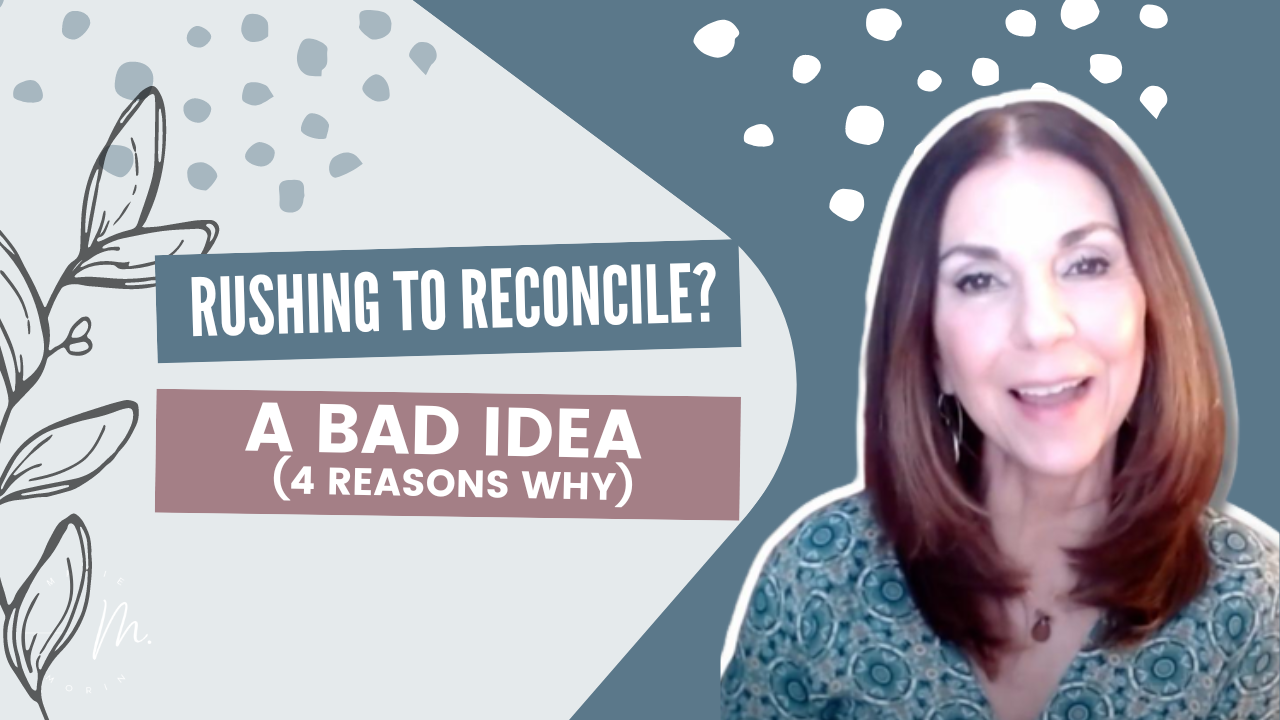Parents are incredibly vulnerable when estranged. Anxiety can make you want to attempt to reconnect and reconcile quickly. Because of the discomfort, it feels easier to go ahead and push for reconnection rather than sit with uneasy feelings of uncertainty and sadness.
When Rushing To Reconcile With Your Estranged Adult Child Is A Bad Idea
In this article you will learn 4 reasons why it may not be a good idea to rush into reconciling with your estranged adult child.
1. Not Enough Space
Adult children who cut ties with their parents are experiencing something. They could be distressed about their own life or relationship, which causes them to seek relief. If you aren’t giving your adult child the space to feel whatever is going on, it alienates you from them.
Adult children often cut ties because they don’t feel you have respected their need for autonomy, and an overly close or smothering parenting style may contribute to estrangement.
Keep in mind that your adult child needs independence. As adults, they must feel they can make their own choices. Whatever their preference, parents must honor and respect the adult child’s decision.
If cutting ties with a parent is a decision they made, they need the time and space to figure out whatever is going on for them. Having little or no contact will not feel pleasant, but by giving them space, you show them that you respect their wishes during this time.
2. Uncomfortable Reminders
When adult children disconnect because of conflicts in your relationship, their distress results from your behavior. When the connection has been tense and stressful for them, something about how you behaved or parented turned them off to your relationship.
So the adult child is reminded, by your pushing, why they may have cut off in the first place. Suppose you rush into reconciling before you have reflected on what they told you about the relationship. You might have yet to do the work to take responsibility, address their feelings, etc. In these cases, they most likely will not be receptive to your attempt at reconciliation.
Suppose your perspective is defensive, or you believe your adult child is entirely wrong and unwilling to take responsibility for your part. In that case, it will make your attempt at reconciling difficult and sabotage any progress. Learning how to communicate, validate, and actively listen is required for a successful reconciliation.
3. Reconciling Takes Time
The average length of estrangement is four and one-half years. It might feel impossible to wait, but the ball is in your adult child’s court. Researcher Kylie Agllias refers to this as an imbalance of power in parent/child relationships.
The adult child gets to decide when they are ready to receive what you have to say. They will be open to hearing you out if and when they are ready. In other cases, the adult child might be going through something deeply personal and not want to engage.
You will benefit from remembering to be patient with the process. Many layers contribute to estrangement. Being informed is essential. Practice compassion for yourself and find empathy for your adult child. What has your adult child told you, and how does it pertain to you?
4. Excuses
You might want to make excuses for why things didn’t work out. Before you’ve done the work to inform yourself of what is going on for your child, you could fall into the trap of over-apologizing and making excuses for why you were the way you were or whatever the situation may have been.
You may feel falsely accused of bad parenting or being toxic or abusive. It is normal to be upset; however, when you rush into resolving the rift, you may not see their perspective because you are on the defensive.
Writing emails, phone calls, or trying to communicate through someone else without being informed will leave you well-prepared. Often our gut reaction is to explain, but making excuses will further push your adult child away.
They want you to take responsibility for what hurt them, even if you have different perceptions and realities of whatever happened. Pushing your perception of what went wrong and why too soon will cause pressure before they are ready. In some cases, parents are legitimately falsely accused, and even in this case, validating your adult child is a better move than trying to convince them they are misguided. In these cases, there is a better way to respond and not react without arguing with a false accusation.
Conclusion
Having mastered how to communicate a thoughtful response to a false accusation is essential if you hope to have a new relationship with your adult child. Boundaries must be enforced when adult children are abusive or toxic, typically with addictions and mental illness,
Some factors will not allow reconciling to succeed. It’s important to practice self-care while you process the grief of estrangement. You process grief by understanding your condition, remaining informed, and practicing communication skills. This article discusses When Rushing To Reconcile With Your Estranged Adult Child Is A Bad Idea (Four Reasons Why)









